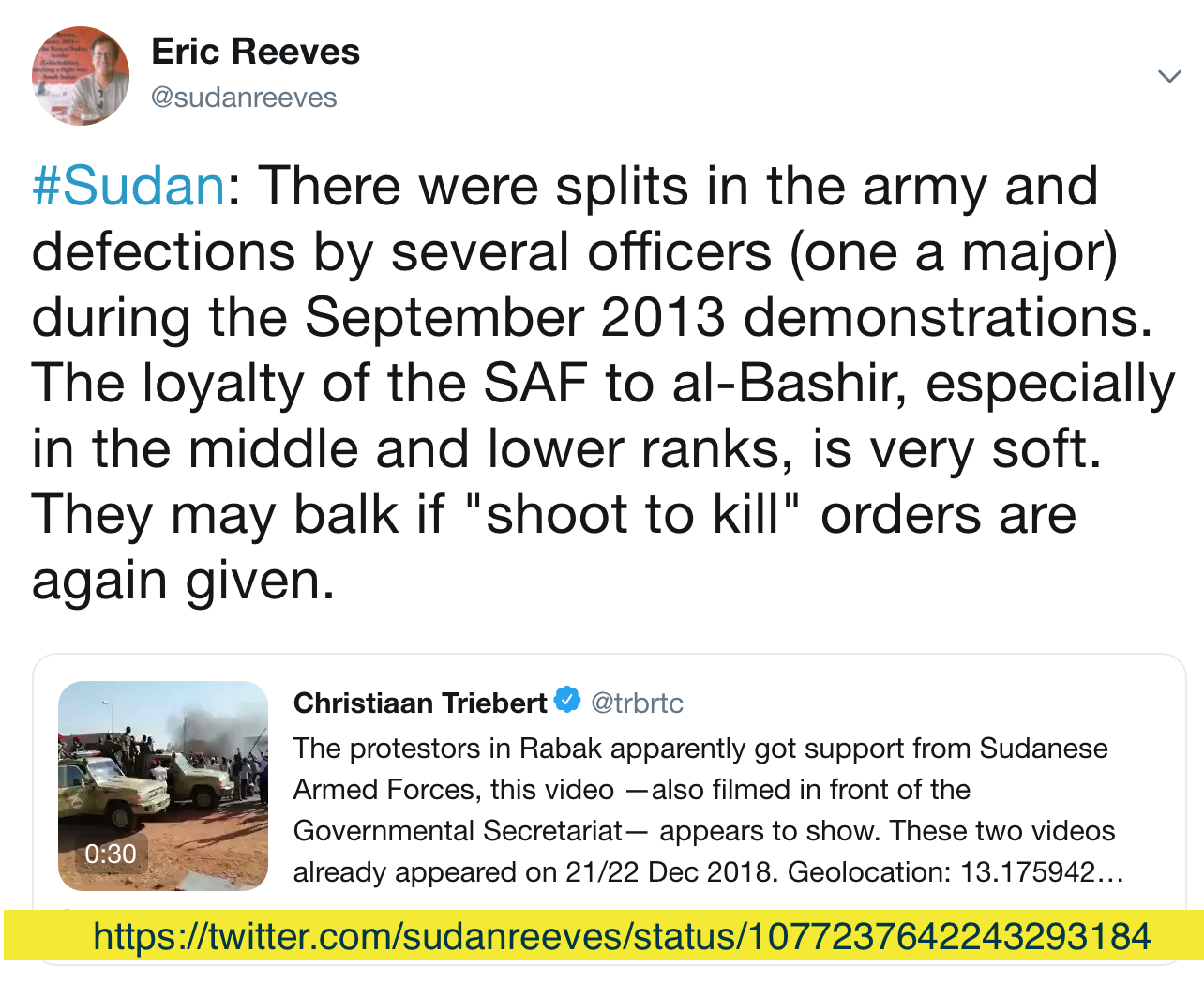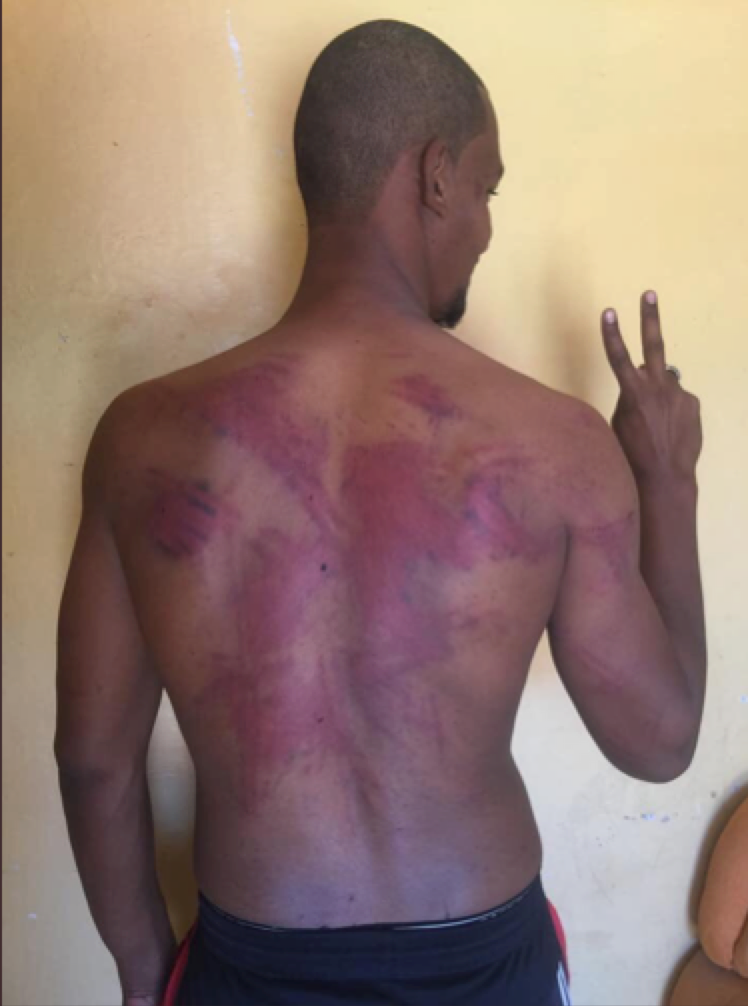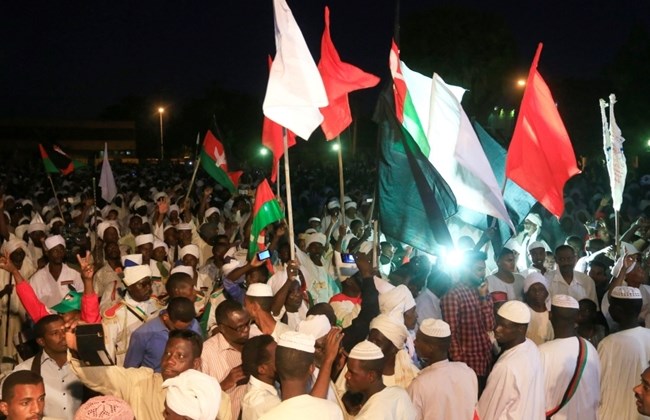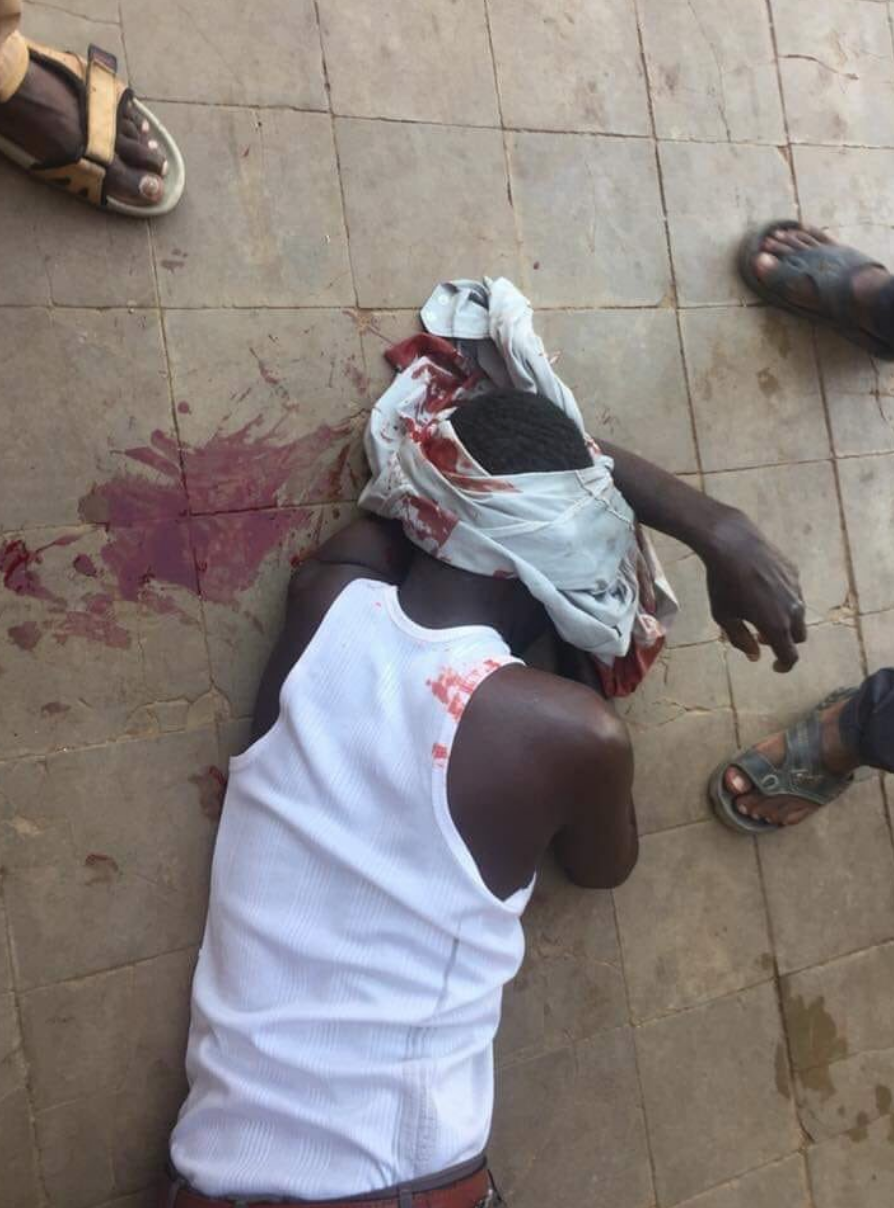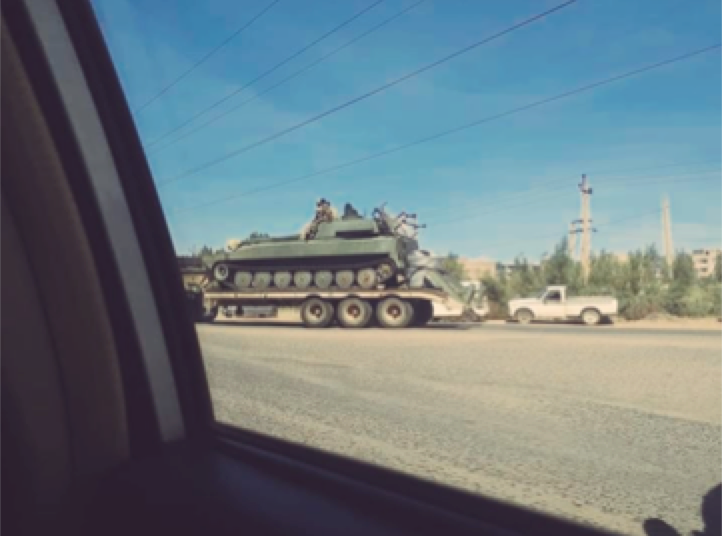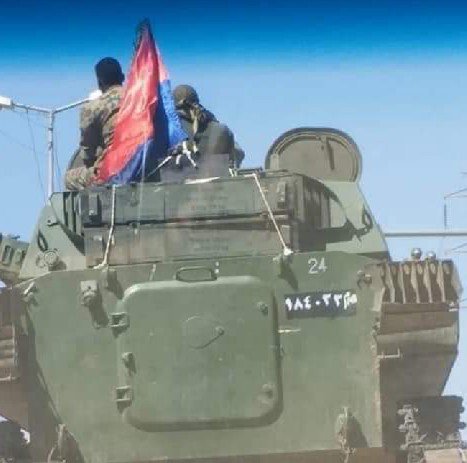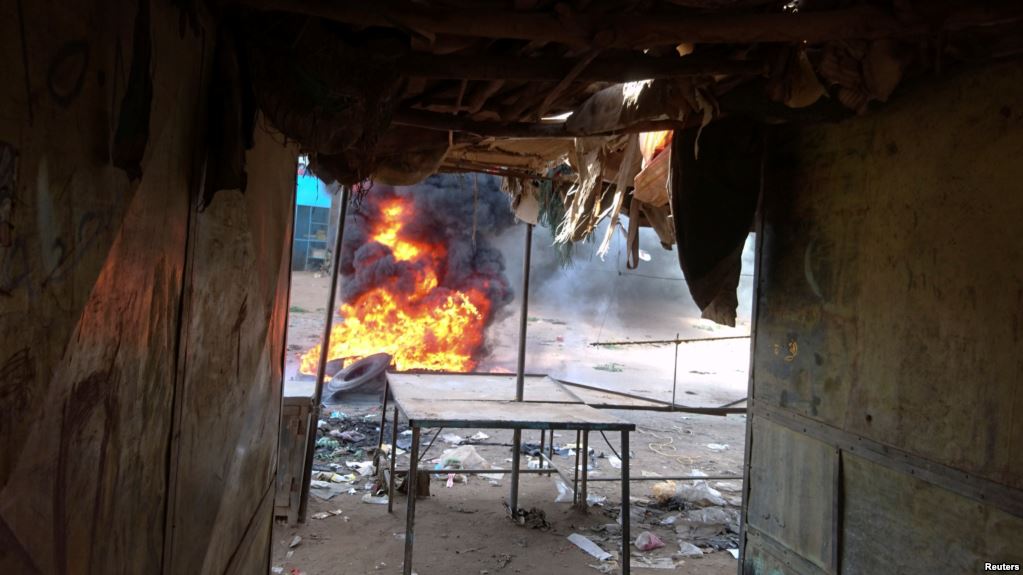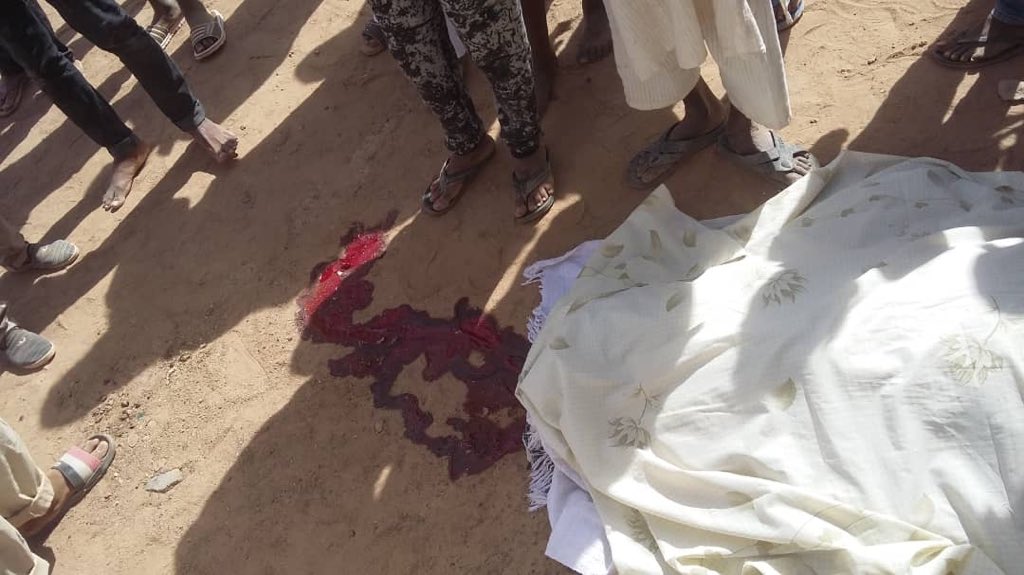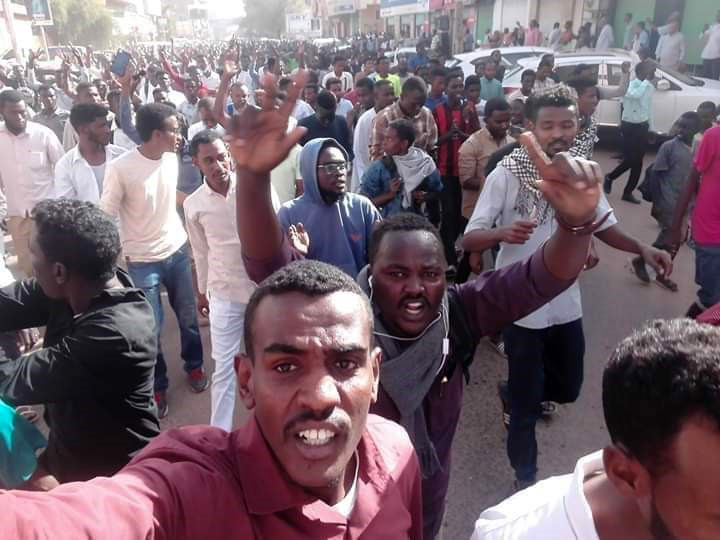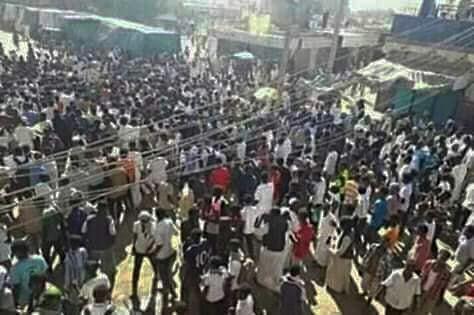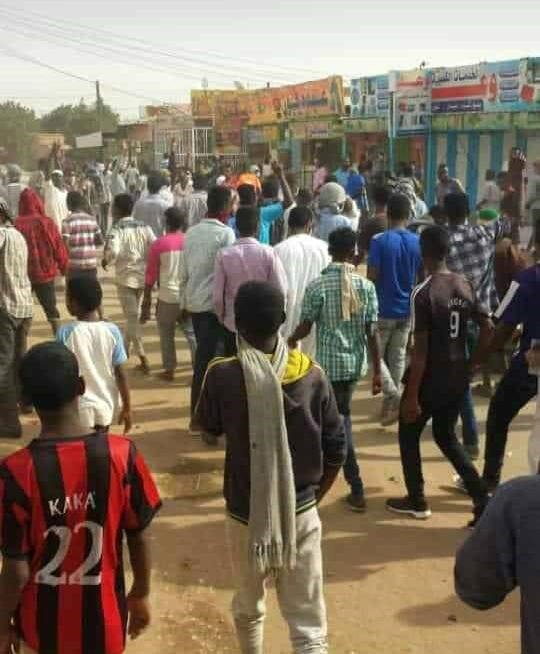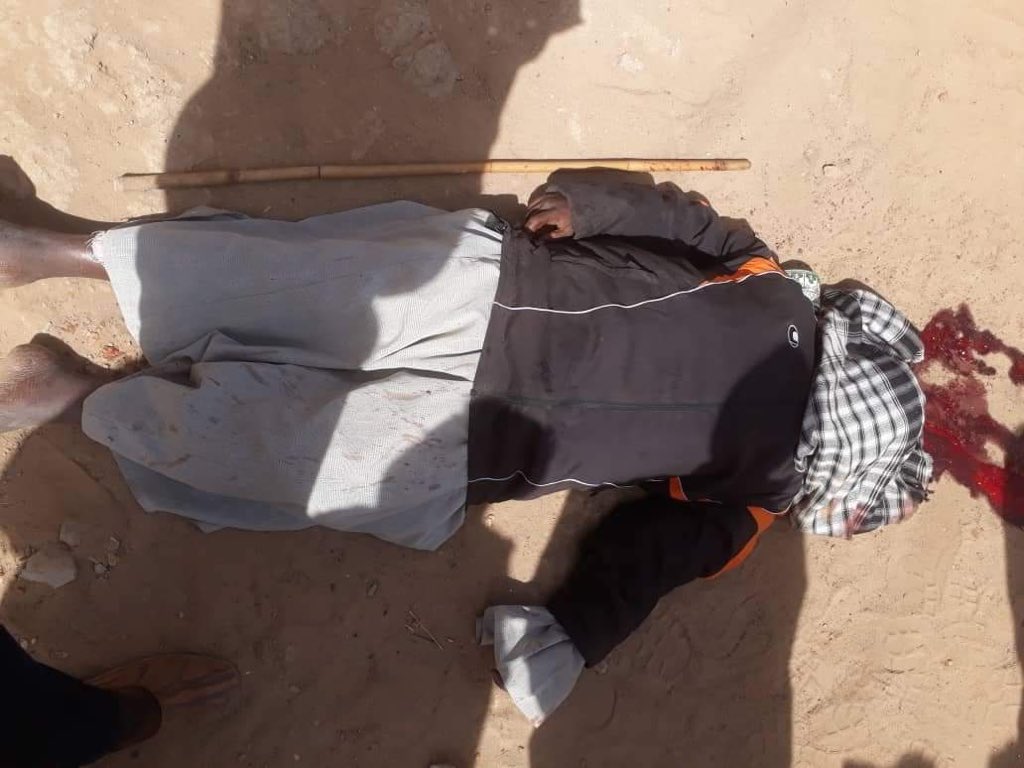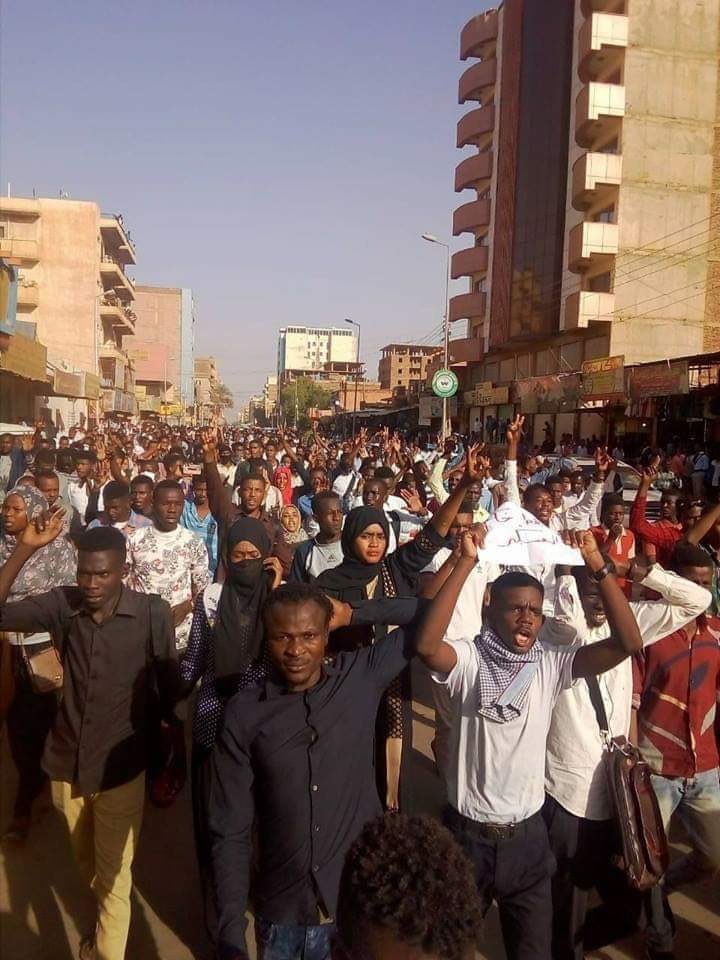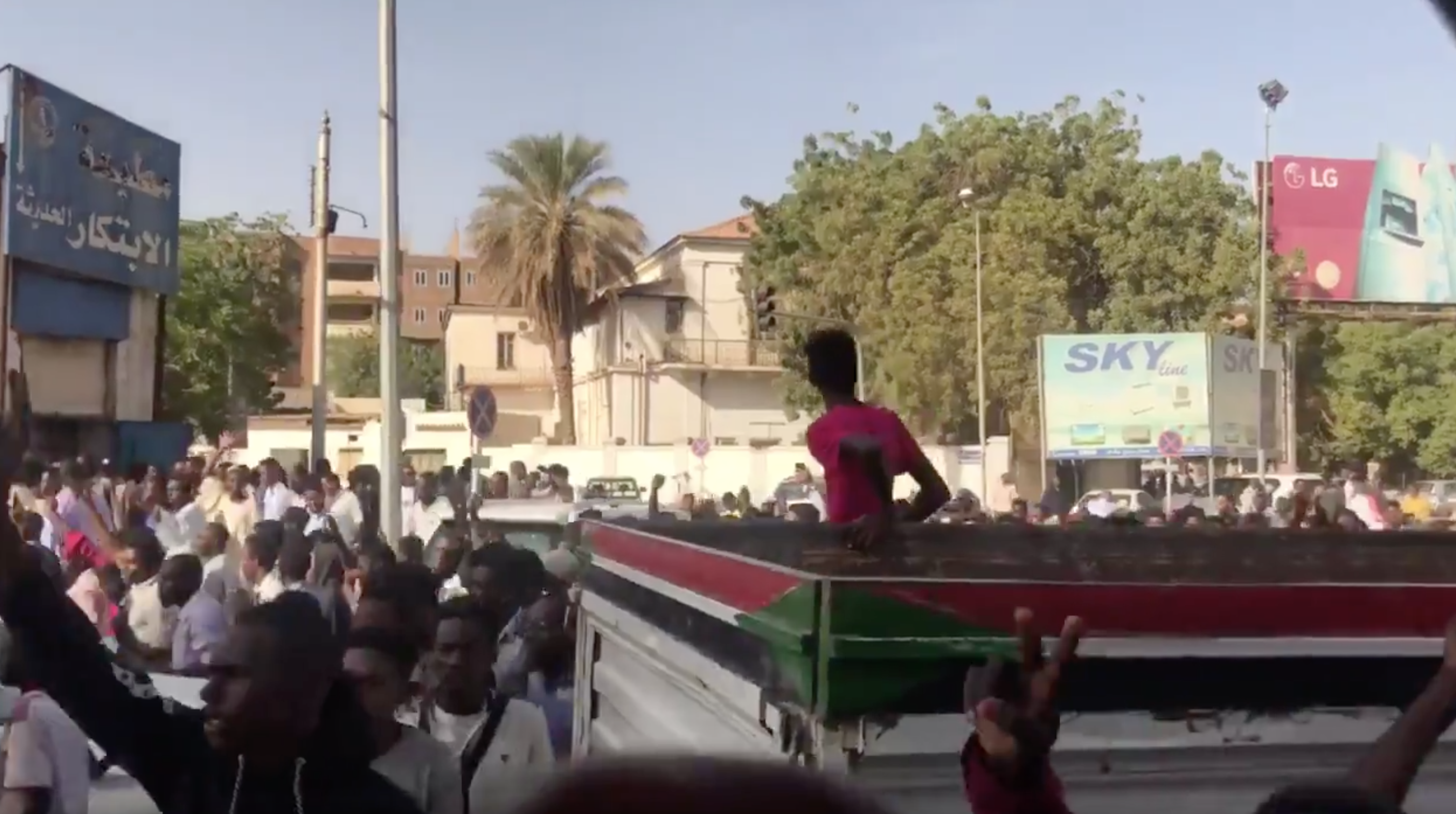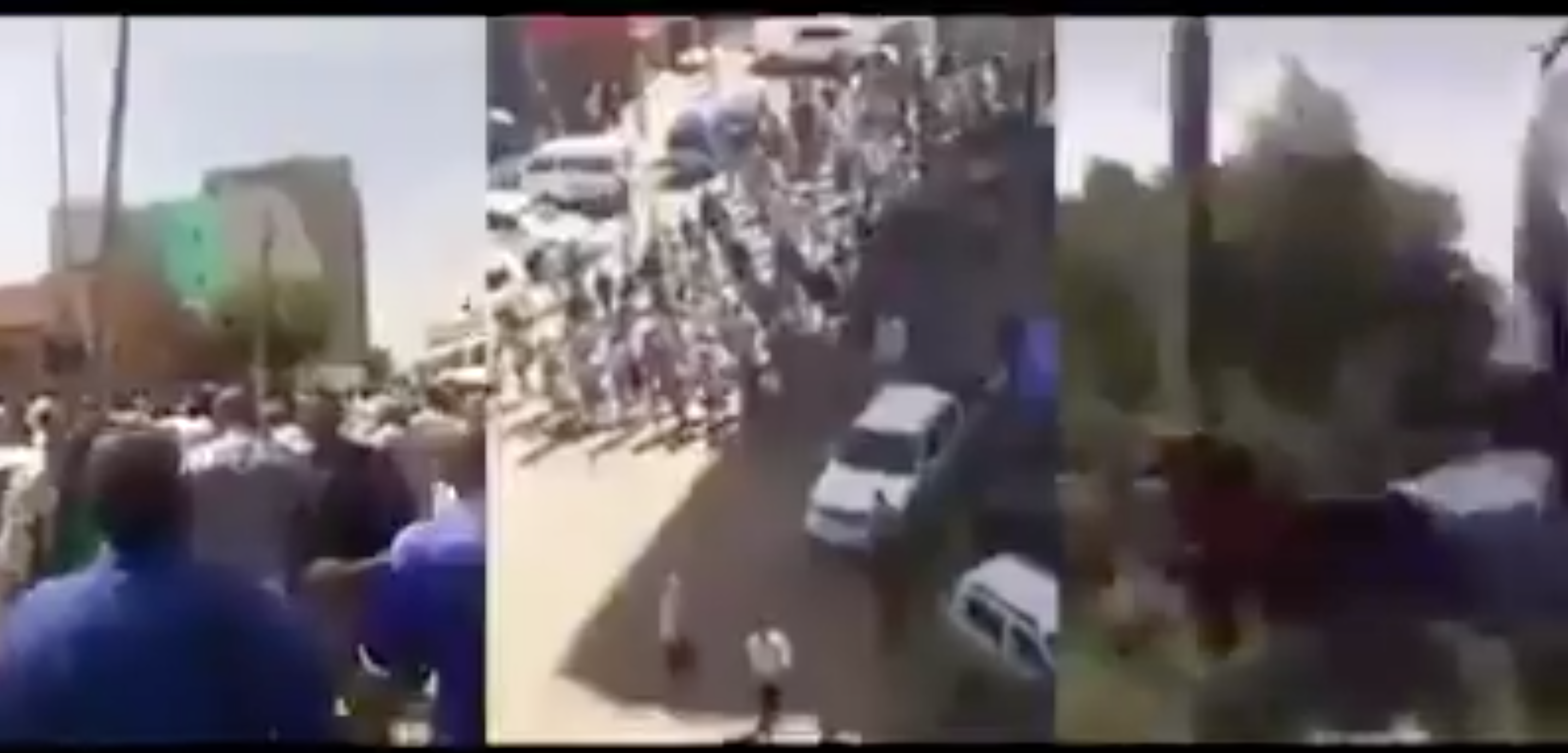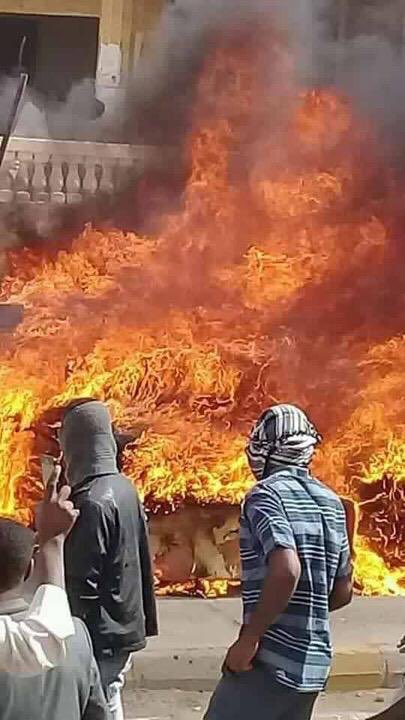SUDAN IS EXPLODING IN PROTESTS: Continuing Updates
Eric Reeves | first posted December 20, 2018, 10:45 EST (to be updated as events warrant) | https://wp.me/p45rOG-2kh
[December 24, 2018, 18:00 EST:
[1] Radio Dabanga reports enormously important defection from Sudan Armed Forces at senior level: Brigadier-General Abdelgader El Sunni urges regime to “comply with the will of the masses and transfer rule to the people of Sudan after you have tried and failed and put the country at loss.”
Is the army breaking apart? Or is the stage being set for a “palace coup,” with al-Bashir the sacrifice?
Radio Dabanga, December 24, 2018 | KORDOFAN / DARFUR / KHARTOUM / EL GEZIRA
A senior officer in the Sudan Armed Forces sent a message to President Omar Al Bashir, Vice President Bakri Hasan Saleh, Defence Minister Lt. Gen. Ahmed Bin Auf and all the military commanders in power to step down and transfer the government to the people of Sudan in compliance with the will of the masses.
Brig Abdelgader El Sunni said in his letter:
“You betrayed us first and then you failed the Sudanese people, and you put the country back.”
The brigadier said in his letter to the army, to his colleagues, and Al Bashir and Saleh and the military commanders in charge of the matter. He pointed out that there are many officers, non-commissioned officers and soldiers of the armed forces who see what the masses see and inevitably support their people.
“I say to you, colleagues, comply with the will of the masses and transfer the rule to the people of Sudan after you have tried and failed and put the country at loss.”
[2] The Khartoum regime gives every sign of continuing its deadly attacks on protestors throughout Sudan. Amnesty International now puts the death toll at 37, with many more seriously wounded. This strongly suggests that coming days will be extremely bloody:
AMNESTY INTERNATIONAL | 24 December 2018
Sudan: 37 protesters dead in government crackdown of protests
Amnesty International has credible reports that 37 protesters have been shot dead by the security forces in five days of anti-government demonstrations that have rocked the country.
“With further protest planned tomorrow, the fact that the security forces are using lethal force so indiscriminately against unarmed protesters is extremely troubling,” said Sarah Jackson,
Amnesty International’s deputy director for East Africa, the Great Lakes and the Horn.
“With dozens already dead, the government must rein in this deadly use of force and prevent more unnecessary bloodshed. Instead, of trying to stop people from demonstrating, the authorities should be focusing on ending longstanding repression of human rights and resolving the economic crisis that have collectively precipitated these protests.”
Background
For further information see https://www.amnesty.org/en/latest/news/2018/12/sudan-shooting-of-protestors-must-be-immediately-investigated/
Katy Pownall
Deputy Head of News and Media
T: +44 (0) 20 3036 5111
M: +44 (0) 7778 472 116 @amnestypress
[3] The UN security office in Sudan has warned of thousands of Rapid Support Forces arriving this afternoon in Khartoum from Libya border area. Given existing tensions between the army and police, arrival of large RSF force makes potential for extreme violence between armed elements high, with deadly consequences for civilians.
UN office in Sudan/Internal security alert
“Thousands of Rapid Support Forces (RSF) arrived in Khartoum today around 1600hrs. The force was coming from Darfur and some from the border within Libya who were assigned for human trafficking issues. The force is likely to be fully involved to restore calm in the capital city Khartoum, in regards with tomorrow’s planned march.
According to latest information received, authorities denied any kind of flexibility to authorize protesters to proceed to the Republican Palace. As result we may likely expect tension and clashes between Security and protesters.”
[4]
[December 24, 2018, 9:00 EST:
Tweets of note:
•Replying to @DavidLelliottUK
Nunna Retweeted LATEEF:
https://twitter.com/leteeff/status/1076804632003829760?s=19 … @UKinSudan #HumanRights Sudanese youth are being tortured inside security detentions. Please call on Sudan to end all violations against peaceful protesters.
• LATEEF @leteeff
Mustafa was arrested yesterday by NISS from his family home, which located in Al-Kalakala, a suburb in Khartoum . And he was brutally tortured before got released. …
1:10 AM – 24 Dec 2018
News dispatches (Al Jazeera and Associated Press (Cairo) continue to provide the most complete non-Sudanese news coverage of events in Sudan):
• “Anti-government protests continue in Sudan for fifth day: Doctors are expected to strike on Monday, with other professions calling for a work stoppage later in the week, “Al Jazeera, December 24
Previously:
Anti-government protests continue in Sudan for fifth day (today)
Will Sudan’s Bashir survive the protests? (yesterday)
Sudan protests over rising prices continue for fourth day (yesterday)
Protests in parts of Sudan continued for the fifth consecutive day on Sunday, as doctors prepared to strike over the rising cost of bread and fuel. At least 12 people have been killed since demonstrations began on Wednesday after the government hiked the price of a loaf of bread from one Sudanese pound to three (about $0.02 to $0.06), exacerbating grievances over price rises, shortages of basic commodities and a cash crisis. Protesters are calling for President Omar Hassan al-Bashir, who has been in power for three decades, to step down.
“Fuel and bread shortages may have triggered protests across the country, but other factors now seem to be helping to keep them going,” Al Jazeera’s Hiba Morgan, reporting from the capital, Khartoum, said. “People seem to be frustrated not just by the economic crisis, but by the way the country is being run and they want to see change.” On Sunday, residents in Um Rawaba, 200km southwest of the capital Khartoum, told AFP news agency that some 600 people gathered in the market chanting, “the people want the fall of the regime.”
Protesters burned tyres and branches in the streets and attempted to storm a government building before being turned back by security officials, witnesses said.
In Atabara, 300km northeast of the capital, riot police and plain-clothed operatives deployed tear gas against hundreds of protesters, a witness said. Police also fired tear gas on protesters in Khartoum after hundreds of protesters blocked a road in the centre of the city late on Sunday. Earlier in the day, there was a tense calm as schools and universities were shuttered by a nation-wide government suspension and riot police equipped with batons and tear gas guarded buildings. “We were asked to leave this morning,” said a university student from northern Khartoum.
Sudanese queued outside bakeries in the city, where vendors were refusing to sell more than 20 loaves of bread per person.
“I have a big family and this bread is not enough for three daily meals,” a local resident told AFP.
A bakery worker said a security guard standing nearby was not allowing the shop to sell any more.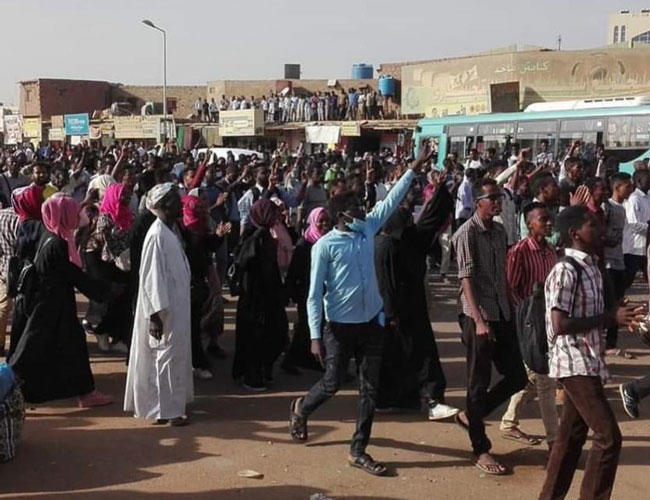
Doctors strike
Doctors are also set to go on strike on Monday in the first of a series of work stoppages, announced by an umbrella coalition of professional unions. In a statement, the coalition said the doctors will continue to deal with emergencies during the strike, which aims to “paralyse” the government and deny it much-needed revenues. The coalition also called on citizens to continue their street protests.
There have also been calls by a number of independent trade and professional unions for a general strike on Wednesday.
Sara Abdelgalil, president of the Sudan Doctors’ Union in the UK, said Sudan is headed for a total shutdown if there’s no change in leadership, calling the recent protests “the tip of the iceberg”.
“I don’t think people on the streets are protesting just because of fuel and bread. They are protesting because there is an overall failure of the whole system,” she told Al Jazeera.
“For the medical sector, there is complete destruction for the infrastructure, for the access of health services, for the cost of treatment, for the absence of life-saving medication, so the health sector is similar to education and other sectors in Sudan where there is an overall failure from the current government, therefore they have to step down and hand over the power to a government that can lead and can provide a better life for the people of Sudan,” added Abdelgalil.
Participants in the protests have so far numbered in the hundreds or low thousands in each location but their continuation for nearly a week despite the use of force by police suggests the level of popular discontent over al-Bashir’s rule is at a dangerously high level. Sudan’s official news agency SUNA reported on Sunday that authorities had arrested a “cell of saboteurs” which had planned “acts of vandalism in the capital.”
The official outlet said the “cell” includes members opposition groups but did not elaborate.
Sadiq Youssef from the opposition coalition, the National Consensus Forces alliance, had said earlier that 14 members of his group, including its president Farouk Abu Issa, were arrested as they left a meeting.
A group bringing together representatives of different professions called in a statement on Sunday for a series of strikes over the price rise, starting with hospitals from Monday.
“This crisis can’t be left to the government to solve alone, other political parties need to come in and join hands to find a way out,” Abu Alqasim Idris, economic analyst, told Al Jazeera. “The crisis is no longer an economy crisis, it’s now a political crisis and people are blaming the government for it.”
Economic struggles
Anger has been rising across Sudan over the rising costs of bread and fuel and other economic hardships, including skyrocketing inflation and limits on bank withdrawals…
This year after a government decision to stop state-funded imports of wheat. Officials had hoped the move would create competition between private companies importing wheat, and therefore, act as a check on price rises. But a number of bakeries stopped production, citing a lack of flour. This forced the government to increase flour subsidies by 40 percent in November.
Meanwhile, the value of the Sudanese pound has slumped by 85 percent against the US dollar this year, while inflation soared to nearly 70 percent in September. In October, Sudan sharply devalued its currency from 29 pounds to the dollar to 47.5 after a body of banks and money changers set the country’s exchange rate. The move led to further price increases and a liquidity crunch, while the gap between the official and black market rates has continued to widen.
The economic crisis is one of the biggest tests faced by al-Bashir, who took power in a coup in 1989.
In recent months, he has dissolved the government, named a new central bank governor and brought in a package of reforms, but the moves have done little to improve the situation. Meanwhile, Qatar has offered its support to al-Bashir, according to Sudan’s state news agency. Sheikh Tamim bin Hamad Al Thani spoke to al-Bashir on the phone on Saturday and pledged Qatar’s “readiness to provide all that is needed to help Sudan get through this crisis”, the Sudanese state news agency reported.
• Doctors to strike in Sudan after five days of protests, Associated Press, December 24, 2018 (CAIRO)
Sudan’s doctors will go on an indefinite strike in the first of a series of work stoppages amid protests calling on the country’s longtime autocratic leader, President Omar Bashir, to step down, an umbrella coalition of professional unions said Sunday. In a statement, it said the doctors will continue to deal with emergencies during the strike, which begins Monday and aims to “paralyze” the government and deny it much-needed revenues. The coalition also called on citizens to continue their street protests, which entered their fifth day Sunday, according to activists, with demonstrations in several cities.
There have also been calls by a number of independent trade and professional unions for a general strike Wednesday.
The protests are chiefly over the rising prices and shortages of food and fuel. A steep rise decreed last week in the price of bread, a main staple for most Sudanese, proved to be the final straw. The protests prompted authorities to suspend classes in schools and universities in a string of cities, including the capital Khartoum, and to impose a nighttime curfew in some of them.
According to Sudanese activists, protests took place Sunday in north Kurdofan, west of Khartoum, and Gadaref, east of the capital, where six people were reported killed last week in clashes with police. They said protests also spread to south and north Darfur in western Sudan.
Protests continued in the railway city of Atbara north of Khartoum as well, where police used tears gas and batons to disperse nearly a 1,000 demonstrators, according to the activists, who spoke on condition of anonymity for fear of reprisals.
Participants in the protests have so far numbered in the hundreds or low thousands in each location, but their continuation for nearly a week despite the use of force by police suggests the level of popular discontent over Bashir’s rule is at a dangerously high level.
Opposition leader Sadiq al-Mahdi, whose democratically elected but ineffective government was ousted in a military coup led by Bashir in 1989, told reporters Saturday that as many as 22 people had been killed in clashes with police since the protests began. The government has acknowledged fatalities but provided no figures. Mahdi triumphantly returned home last week from a year in exile abroad. Thousands of his supporters welcomed him. Addressing a news conference Saturday, he said the protests were legitimate and that he supported a “peaceful change” of government.
Bashir, who is in his mid-70s, has in the past ordered the use of force against protesters, including in the last round of unrest in January, successfully crushing them to remain one of the longest-serving leaders in the region. Although his time at the helm has seen Sudan plunging into one crisis after another, he is seeking a new term in office. Lawmakers loyal to him are already campaigning to rally support for constitutional amendments that would allow him to run in the 2020 election.
While sparked by worsening economic conditions, the ongoing protests have taken an increasingly political slant, particularly after the killing of protesters Thursday.
Demonstrators now chant slogans calling on Bashir’s Islamic government to step down.
Qatar’s ruler Sheikh Tamim bin Hamad Al-Thani spoke to Bashir by phone Saturday, lending his support “to help Sudan get through this crisis” and offering aid. Qatar is at sharp odds with some of Sudan’s key Arab backers, including Saudi Arabia, the UAE and Egypt, its powerful neighbor to the north. Qatar’s aid offer, the details of which are yet to be announced, could either discourage those allies from helping Bashir ride out the current crisis or, to the benefit of Sudan, prompt them to match Qatar’s aid or even outdo it.
• Sudan protests: Police fire tear gas as violence spreads | BBC, 23 December 2018
Police in Sudan have fired tear gas at protesters as part of violent anti-government protests that have spread across the country. Hundreds of demonstrators blocked a road near a football stadium in the capital, Khartoum, on Sunday before clashing with riot police. Opposition figures say 22 demonstrators have been killed since Wednesday, but officials say the figure is much lower.
The protests erupted after bread and fuel price rises were announced. Over the past year, the cost of some goods has more than doubled, inflation has risen to nearly 70%, the value of the Sudanese pound has fallen sharply and shortages have been reported in cities including the capital Khartoum.
A group of doctors has also said that its members will go on strike from Monday to increase pressure on President Omar al-Bashir.
What is the latest?
Sunday’s clashes happened as crowds of people spilled out of a football match in Khartoum.
They blocked roads and chanted anti-government slogans before riot police fired tear gas in an attempt to disperse them. Earlier, footage on social media appeared to show continuing protests in a number of areas. The Central Sudanese Committee of Doctors said its members had seen protesters in hospitals with gunshot wounds and said there had been a number of deaths and injuries.
On Saturday the authorities arrested 14 leaders of the National Consensus Forces, an opposition coalition, including the grouping’s 85-year-old leader Farouk Abu Issa, a spokesman said.
“We demand their immediate release, and their arrest is an attempt by the regime to stop the street movements,” spokesman Sadiq Youssef said.
• Fatal Sudan bread riots escalate with calls to topple President al-Bashir, The Times (UK) December 24 2018, 12:01am
Sudan’s despotic president is facing the biggest challenge of his 29-year iron rule after days of spontaneous “bread protests” resulted in a fatal crackdown by his security forces.
More than 30 people have been killed in clashes with police, opposition leaders said. Thousands of people have demonstrated in more than 15 towns and cities against worsening economic conditions and corruption.
Professionals including doctors have vowed to go on indefinite strike from today, demanding that President al-Bashir, 74, surrender power. A march on parliament in Khartoum, the capital, is planned for Boxing Day at which protesters say they expect the state will use “disproportionate force and continue killing peaceful demonstrators.”
[December 23, 2018, 19:00 EST:
Evidence continues to mount that the Khartoum regime is ramping up military deployments, especially in Khartoum in response to surging protests, now in their fifth day. Mortality is increasing.
Al Jazeera continues to provide the most comprehensive non-Sudanese news coverage.
*******************************************
Is Khartoum dramatically ramping up military/security measures? Reports of snipers in tall buildings in Khartoum and Jon Hutson ( @JonHutson) reports from sources in Sudan (12: 30 EST, December 23, 2018):
[1] A detail from this photo, taken near the Khartoum airport in the late afternoon on 12/23, shows the number 24 stenciled on the back of a tank. Below that, in white, is Arabic text for “Armed Forces,” and the number 184033. The soldiers are in SAF uniforms. A NISS base is nearby.
[2] #SudanUprising photos: Sources in Khartoum report on 12/23 that #Sudan Armed Forces tanks and technicals from al Shagra (HQ of SAF artillery) occupy streets near the Vegetable Market and the nearby bus station, and 60th Street (behind the airport, where many ministers live).
*********************
Notably, the Tweet referred to in the AP dispatch below—pledging Sudan Armed Forces (SAF) support for al-Bashir and his regime—comes from state-controlled media, not the SAF itself. The army may well stand behind the regime, at least for the present. But it may also orchestrate a change in leadership. Perhaps this is just propaganda…
• “Sudan’s military pledges to stand by embattled president,” ASSOCIATED PRESS (CAIRO — Dec 23, 2018, 2:18 PM ET) | https://abcnews.go.com/International/wireStory/doctors-strike-sudan-protests-continue-59983823
Sudan’s military on Sunday pledged to stand by President Omar Bashir, according to a tweet by the country’s state news agency, a timely show of support as the embattled leader faces ongoing street protests decrying worsening economic conditions and demanding that he step down. “The armed forces assert that it stands behind its leadership and its keen interest in safeguarding the people’s achievements and the nation’s security, safety along with its blood, honor and assets,” said the tweet, quoting a military statement.
Bashir hails from the military establishment, which has dominated the country in the six decades since independence from Anglo-Egyptian rule in 1956. The Sudanese president was an army Brigadier-General when he joined forces with Islamists to seize power in a 1989 military coup that toppled a freely elected but ineffective government. The military statement came as opposition to Bashir mounted and violent street protests continued in a string of cities across the country.
On Sunday, an umbrella coalition of professional unions said the nation’s doctors will go on an indefinite strike that is expected to be the first of a series of work stoppages amid protests calling on Bashir to step down.
• “Sudan: Protests over price hikes continue for fifth day: Doctors are expected to strike on Monday, with other professions calling for a work stoppage later in the week,” Al Jazeera, December 23, 2018 | https://www.aljazeera.com/news/2018/12/sudan-protests-price-hikes-continue-day-181223154312618.html
Protests in parts of Sudan continued for the fifth consecutive day on Sunday, as doctors prepared to strike over the rising cost of bread and fuel. At least 10 people have been killed since demonstrations began on Wednesday after the government hiked the price of a loaf of bread from one Sudanese pound to three (about $0.02 to $0.06). Protesters are calling for President Omar Hassan al-Bashir to step down.
On Sunday, residents in Um Rawaba, 200km southwest of the capital Khartoum, told AFP news agency that some 600 people gathered in the market chanting, “the people want the fall of the regime.” Protesters burned tyres and branches in the streets and attempted to storm a government building before being turned back by security officials, witnesses said.
In Atabara, 300km northeast of the capital, riot police and plain-clothed operatives deployed tear gas against hundreds of protesters, a witness said.
Police also fired tear gas on protesters in Khartoum after hundreds of protesters blocked a road in the centre of the city late on Sunday. Earlier in the day, there was a tense calm as schools and universities were shuttered by a nation-wide government suspension and riot police equipped with batons and tear gas guarded buildings.
“We were asked to leave this morning,” said a university student from northern Khartoum.
Sudanese queued outside bakeries in the city, where vendors were refusing to sell more than 20 loaves of bread per person. “I have a big family and this bread is not enough for three daily meals,” a local resident told AFP. A bakery worker said a security guard standing nearby was not allowing the shop to sell any more.
Doctors strike
Doctors are also set to go on strike on Monday in the first of a series of work stoppages, announced by an umbrella coalition of professional unions. In a statement, the coalition said the doctors will continue to deal with emergencies during the strike, which begins Monday and aims to “paralyse” the government and deny it much-needed revenues. The coalition also called on citizens to continue their street protests.
There have also been calls by a number of independent trade and professional unions for a general strike on Wednesday. Participants in the protests have so far numbered in the hundreds or low thousands in each location but their continuation for nearly a week despite the use of force by police suggests the level of popular discontent over al-Bashir’s rule is at a dangerously high level.
A wave of unrest has rocked Sudan since Wednesday after the government hiked the price of a loaf of bread from one Sudanese pound to three [Al Jazeera].
The official outlet said the “cell” includes members opposition groups but did not elaborate.Sudan’s official news agency SUNA reported on Sunday that authorities had arrested a “cell of saboteurs” which had planned “acts of vandalism in the capital”.
Sadiq Youssef from the opposition coalition, the National Consensus Forces alliance, had said earlier that 14 members of his group, including its president Farouk Abu Issa, were arrested as they left a meeting.
A group bringing together representatives of different professions called in a statement Sunday for a series of strikes over the price rise, starting with hospitals from Monday.
Economic struggles
Anger has been rising across Sudan over the rising costs of bread and fuel and other economic hardships, including skyrocketing inflation and limits on bank withdrawals.
Bread prices have more than tripled since the start of this year after a government decision to stop state-funded imports of wheat. Officials had hoped the move would create competition between private companies importing wheat, and therefore, act as a check on price rises. But a number of bakeries stopped production, citing a lack of flour. This forced the government to increase flour subsidies by 40 percent in November.
• “Sudan doctors strike as protests enter fifth day,” BBC, December 23, 2018 | https://www.bbc.com/news/world-africa-46666237
Fresh anti-government protests have erupted in Sudan as doctors said they would go on strike to increase pressure on President Omar al-Bashir. An independent group of medics said that from Monday they would focus on treating wounded protesters.
On Saturday Sudan’s main opposition leader said security forces had killed 22 demonstrators. Officials say the toll is lower.
Protests began on Wednesday after bread and fuel price rises were announced. Over the past year, the cost of some goods has more than doubled, inflation has risen to nearly 70%, the value of the Sudanese pound has fallen sharply and shortages have been reported in cities including the capital Khartoum.
What is the latest?
Footage on social media appeared to show continuing protests in a number of areas.
The Central Sudanese Committee of Doctors said its members had seen protesters in hospitals with gunshot wounds and said there had been a number of deaths and injuries.
On Saturday the authorities arrested 14 leaders of the National Consensus Forces, an opposition coalition, including the grouping’s 85-year-old leader Farouk Abu Issa, a spokesman said.
“We demand their immediate release, and their arrest is an attempt by the regime to stop the street movements,” spokesman Sadiq Youssef said.
How did the protests begin?
They started in the eastern town of Atbara, where demonstrators burned the offices of Mr Bashir’s National Congress party.
On Thursday officials said six people had died in protests in the town of al-Qadarif and two more in Atbara.
Witnesses said that in some areas the military was not intervening and even appeared to be siding with the demonstrators.
A presidential adviser, Faisal Hassan Ibrahim, said two of those killed in al-Qadarif were soldiers in civilian clothes. He said the protests were being directed by “organised entities,” without giving further details.
Syria’s President Assad earlier this month – has said he will step down in 2020
Demonstrations spread to Khartoum and its twin city Omdurman as well as other areas. On Saturday AFP quoted witnesses as saying police used tear gas and beat protesters calling for Mr Bashir to step down in Wad Madani, southeast of Khartoum.
In El Rahad, southwest of Khartoum, the NCP office and other administrative offices were set ablaze and protesters chanting “no to hunger” were tear-gassed, another witness said.
Why is Sudan’s economy in trouble?
Mr Bashir was accused of sponsoring terrorism by the US in the 1990s and Sudan was placed under a trade embargo…
US sanctions were lifted in 2017 but there has been little improvement in the country’s economy since then. In January this year there were protests in Khartoum and other regions over rises in the price of bread.
In 2016 Mr Bashir told the BBC that he would step down as president in 2020.
[December 23, 2018, 12:00 EST:
Khalid Taha ( @KhalidmeTaha ) reports:
• Heavy military equipment and tanks have been deployed to various parts of Khartoum;
• Snipers have been seen in some high buildings.
Protests are reported to have spread to Kass and Buram, South Darfur—they are ongoing in many areas including Atbara, Gezira, Gedaref, South Kordofan.
An excellent panel discussion of the key issue: “Will Sudan’s Bashir survive the protests? Public anger is growing in Sudan over rising food prices, with violent protests taking place across the country,” Al Jazeera (“Inside Story”), December 23, 2018| https://www.aljazeera.com/programmes/insidestory/2018/12/sudan-bashir-survive-protests-181222175906337.html
[December 23, 2018, 10:00 EST:
Notable news items are many, but of particular significance is the strike by doctors (see below) and call for a general strike on Wednesday, December 26, 2018.
The Financial Times is reporting that local journalists now indicate that as many as 28 people have been killed by police/security forces, with increasing evidence of “shoot to kill” orders of the sort issued by the regime in September 2013:
Two rights groups, Amnesty International and the African Centre for Justice and Peace Studies, accused the government of using a shoot to kill policy against this week’s protests, saying they had documented 50 deaths in rioting on Tuesday and Wednesday. (The Guardian, September 27, 2013 | https://www.theguardian.com/world/2013/sep/27/sudanese-protesters-attacked-march-fuel-subsidies )
• Sudan hit by deadly clashes as food price protests intensify: Anti-government rallies present significant challenge to President Omar al-Bashir | Financial Times, December 23, 2018
Sudan’s president, Omar al-Bashir, is under growing pressure as anti-government rallies spread. Anti-government demonstrations in Sudan over rising food prices have led to deadly clashes between state security forces and protesters in what may be the biggest popular challenge yet to the 29-year rule of Sudanese president Omar al-Bashir.
The protests, which started in the eastern city of Atbara on Wednesday over a government decision to raise the price of bread, have spread to at least three other cities, including the capital Khartoum. Amnesty International said on Friday that at least nine people had been shot by security forces, while local journalists reported on Saturday that as many as 28 may have been killed.
The authorities also arrested 14 leaders of an opposition coalition, Reuters reported. The violence follows similar protests in Khartoum in 2013 and in January this year over deteriorating economic conditions but the latest demonstrations are the most significant to date, analysts said.
• Doctors to strike in Sudan as protests enter 5th day | Associated Press, December 23, 2018 (CAIRO)
Sudan’s doctors will go on an indefinite strike in the first of a series of work stoppages amid protests calling on the country’s longtime autocratic leader, President Omar Bashir, to step down, an umbrella coalition of professional unions said on Sunday.
In a statement, it said the doctors will continue to deal with emergencies during the strike, which begins Monday and aims to “paralyze” the government and deny it much-needed revenues. The coalition also called on citizens to continue their street protests, which entered their fifth day Sunday, according to activists, with demonstrations in several cities.
There have also been calls for a general strike on Wednesday, but that has not been independently confirmed.
The protests are chiefly over the rising prices and shortages of food and fuel. A steep rise decreed last week in the price of bread, a main staple for most Sudanese, proved to be the final straw. The protests prompted authorities to suspend classes in schools and universities in a string of cities, including the capital Khartoum, and to impose a nighttime curfew in some of them.
[December 22, 2018, 14:30 EST:
Excellent dispatch from Al Jazeera (December 22, 2018):
• Sudan protests over rising prices continue for fourth day: At least 10 people have been killed in anti-government protests across multiple cities over rising bread, fuel prices | Al Jazeera, December 22, 2018 | https://www.aljazeera.com/news/2018/12/sudan-protests-rising-prices-continue-fourth-day-181222142557993.html
At least 10 people have been killed in protests that have swept across Sudan this week amid rising public anger over soaring prices and other economic woes. A government decision to raise the price of a loaf of bread from one Sudanese pound to three (from about two to six US cents) sparked demonstrations across the country on Wednesday. The protests first erupted in the eastern city of Atbara before spreading to Gadarif, also in eastern Sudan, and then to the capital, Khartoum, its twin city Omdurman and other areas.
Authorities on Thursday declared a state of emergency in the eastern city of Gadarif, where six protesters died during clashes with riot police, legislator Al-Tayeb al-Amine Tah told local broadcaster Sudania 24, without providing further details. Two demonstrators were also killed in the northeastern city of Atbara where police fired tear gas to disperse the demonstrators.
Speaking from Khartoum, Al Jazeera’s Hiba Morgan said the protest in the south of the country continued on Saturday with demonstrators burning the government’s headquarters in south Gadarif.
“There are reports that police have been stationed around the country to prevent the protests from breaking out,” said Morgan. “The Sudanese minister of information said on Saturday that they are going to do what they can to ease the economic situation and that bread prices will come down.”
On reports of restricted internet access, Morgan said both the Sudanese government as well as mobile phone companies have denied any responsibility. She said, however, that access to social media platforms remains limited.
On Friday, a spokesperson for the Sudanese government said the protests of the two previous days were “dealt with in a civilised way without repression or opposition.” “Peaceful demonstrations were derailed and transformed by infiltrators into subversive activity targeting public institutions and property, destroying and burning some police headquarters,” the spokesperson was quoted as saying by the official Sudan News Agency. “The crisis is known to the government and is being dealt with.”
Anger has been rising across Sudan over the rising costs of bread and fuel and other economic hardships, including skyrocketing inflation and limits on bank withdrawals. The country’s economy has struggled to recover from the loss of three-quarters of its oil output – its main source of foreign currency – since South Sudan seceded in 2011, keeping most of the oilfields. The country’s economic woes have been exacerbated in the past few years, even as the United States lifted its 20-year-old trade sanctions on Sudan in October 2017.
The US has kept Sudan on its list of state sponsors of terrorism, which prevents Khartoum from accessing much-needed financial aid from institutions such as the IMF and the World Bank.
Bread prices have more than tripled since the start of this year after a government decision to stop state-funded imports of wheat. Officials had hoped the move would create competition between private companies importing wheat, and therefore, act as a check on price rises. But a number of bakeries stopped production, citing a lack of flour. This forced the government to increase flour subsidies by 40 percent in November.
Meanwhile, the value of the Sudanese pound has slumped by 85 percent against the US dollar this year, while inflation soared to nearly 70 percent in September. In October, Sudan sharply devalued its currency from 29 pounds to the dollar to 47.5 after a body of banks and money changers set the country’s exchange rate. The move led to further price increases and a liquidity crunch, while the gap between the official and black market rates has continued to widen. The economic crisis is one of the biggest tests faced by President Omar Hassan al-Bashir, who took power in a coup in 1989.
In recent months, he has dissolved the government, named a new central bank governor and brought in a package of reforms, but the moves have done little to improve the situation.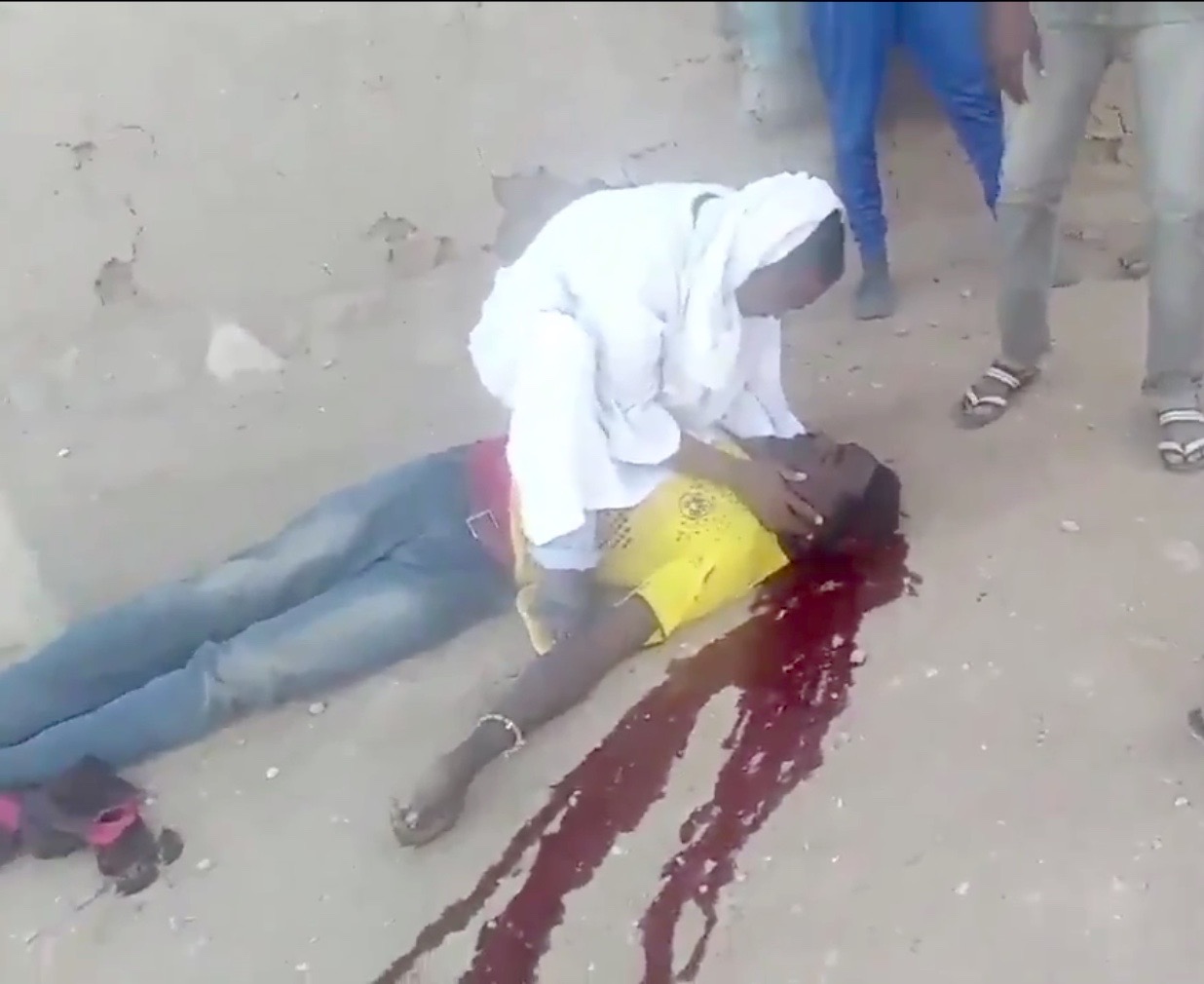
Reuters reports:
• One more death on third day of protests in Sudan | Reuters (Khartoum), December 22, 2018
At least one protester was killed in the northern Sudanese city of Atbara on Dec. 21, the security chief said, as people took to the streets across the country for a third day against price rises and corruption. Police fired teargas at groups who gathered in Atbara and the capital Khartoum’s twin city of Omdurman after noon prayers, witnesses said, and residents reported hearing gunfire in surrounding areas and in the southern state of White Nile.
Web users reported problems accessing the internet, and some accused the government of blocking social media including Facebook, Twitter and WhatsApp in a bid to stop protesters communicating. There was no comment on that from the government.
Public anger has been building over price rises and other economic hardships, including a doubling in the cost of bread this year and limits on bank withdrawals. At least eight people died during larger protests on Dec. 20 when some demonstrators called for the overthrow of President Omar al-Bashir.
[December 21, 2018:
“Sudan Change Now” (Twitter | @SudanChangeNow) is is continuing to provide continuous update on protests in Sudan, including video and still photos, of protests and violent regime responses in many of Sudan’s cities. Although there are an increasing number of international wire reports of the growing protests and demonstrations, the most comprehensive reporting, unsurprisingly, comes from Radio Dabanga.
The dispatches below report in detail on the Khartoum regime’s bocking of the Internet, social media platforms, and telephone communications, as well as the increasingly severe restrictions on newspaper publication. The second dispatch here details, state by state, where the demonstrations are occurring and the death toll from the regime’s violent responses, including nine shooting deaths to date, one a child of three. There are early indications that security forces in plain clothes are among those firing live ammunition, possibly with “shoot to kill” orders:
• Observatory: Internet blocked to suppress Sudan demonstrations | Radio Dabanga, December 21, 2018 | KHARTOUM
An international observatory reports targeted internet disruptions to Sudan’s internet infrastructure to suppress the widespread public demonstrations across the country. There is evidence of attempts to block people from social media platforms through internet providers.
On Thursday night, the Sudanese internet provider Zain-SDN caused serious difficulties in access to in instant messaging services on mobile phones, when demonstrations against the worsening economic conditions ensued for the second or third consecutive day in multiple cities.
According to sources in Sudan, a Sudanese communications authority ordered internet providers to block Facebook, WhatsApp and Twitter applications in an attempt to reduce the transmission of news and protests against the rising bread and fuel prices, among others. People have been unable to massively upload videos and photos of protests like they did on Wednesday and Thursday, such as the video from December 19 that shows the security service driving into a crowd of people in El Gedaref, while shooting live bullets at people. One person is clearly hit and lies on the ground.
Online news articles indicate that President Omar Al Bashir dismissed the current director of Communication and Information Technology Commission (CITC), for not cutting of access when the demonstrations erupted earlier this week.
In addition, the National Intelligence and Security Service (NISS) issues a directive to Sudanese newspapers to prevent news about the demonstrations to be published and distributed among Sudanese people. In detail the directive ordered the press to not print any newspaper before it has removed such content.
Targeted internet disruption
NetBlocks, an organisation mapping targeted internet disruptions worldwide, announced today that data collected by its observatory and volunteers across Sudan provided “detailed technical evidence of an extensive internet censorship regime implemented to suppress public demonstrations across the country.”
Its survey covered major population centres in Sudan and found “varying attempts to block social media platforms Facebook, Twitter and Instagram, and messaging app WhatsApp.”
Sudanese internet provider Zain-SDN was found to have the most extensive blocking scheme, covering all key social platforms, followed by MTN, Sudatel and Kanartel. NetBlocks claims that the blocking is not centralised but applied at the discretion of the commercial operators. The study is ongoing, according to NetBlocks, and initial findings also showed that the internet blocks could have lasting impact on Sudan’s development and knock back confidence, at a time when citizens are already deeply concerned about their cost of living.
Protesters shot
In the past two days the protests have intensified. Security officers on Wednesday and Thursday shot at protestors to disperse them killing at least six people in El Gedaref, one in Atbara in River Nile and two in Karima. In response to security officers opening fire on protesters in Sudan leaving at least nine people dead, five of whom were students, and dozens more injured over the past two days, Seif Magango, Amnesty International’s Deputy Director for East Africa, the Horn and the Great Lakes, said:
“These killings must stop. Opening fire on unarmed protesters cannot be justified and what is clearly needed now is an independent, efficient investigation into these events. All those responsible for unnecessary or excessive use of force, including those with command responsibility, must be brought to justice.
“The government must also immediately and unconditionally release all those arrested for peacefully exercising their right to freedom of expression, association and assembly.”
Magango also pointed to the shutdown of the internet by the Sudanese authorities.
• Sudan price protests continue unabated despite police violence, curfew | Radio Dabanga, December 21, 2018 | EL GEDAREF / KHARTOUM / RIVER NILE / DONGOLA / EL OBEID / PORT SUDAN / SENNAR / KOSTI
Street demonstrations that were violently dispersed, have claimed the lives of at least nine civilians by police fire, official and medical sources confirmed. Dozens of people have been wounded. There have been reports of targeted internet disruptions to Sudan’s internet infrastructure.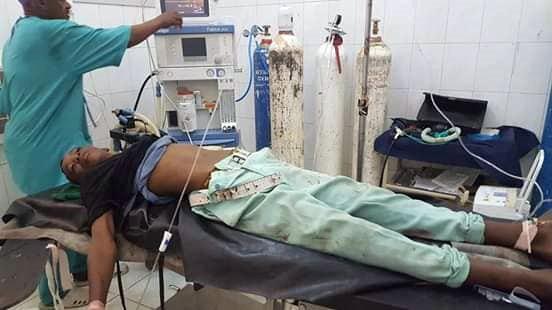
The protests broke out earlier this week across Sudan have continued on Thursday in the Sudanese capital, El Gedaref, El Gezira, Berber, Atbara and several other towns in River Nile, El Obeid, Port Sudan, Dongola, Kosti, and Sennar, against the rising prices of bread and fuel which have caused economic hardship for people in Sudan over the past months.
Authorities on Thursday declared a state of emergency in El Gedaref state, where six protesters died during clashes with riot police, official sources informed local broadcasters yesterday. A state of emergency was declared on Thursday. An independent Member of Parliament, Mubarak El Nur, told Reuters news agency: “The situation in El Gedaref has become dangerous and the protests have developed to include fires and theft and it’s now out of control.”
Earlier, the Committee of Doctors of Sudan reported to Radio Dabanga that police opened fire on demonstrators in separate incidents, killing at least two students in Kareema. A man has been confirmed dead in River Nile state, where authorities also declared a state of emergency.
The deadly and violent repercussions by the military and the security apparatus sparked new protests on Thursday and Friday in various states in Sudan. In El Gedaref and River Nile, a number of protesters were wounded, while in Khartoum traffic has been paralysed because of residents and students moving to the main streets to protest.
Sudan has been suffering from chronic hard currency shortages and a soaring inflation for years. Prices skyrocketed in particular after the government implemented a set of austerity measures in January this year. The crises have led to recurrent shortages in commodities like bread and fuel.
Latest protest updates, per state:
El Gedaref: Angry demonstrators torch offices
In anger, demonstrators have burned the offices of El Gedaref locality and the Water Management department, eyewitnesses told Radio Dabanga, in addition to torching vehicles of the security apparatus and smashing buildings. El Gedaref Hospital has received dozens of wounded people, some of them in serious condition. Demonstrations have seen wide participation from different groups of students, residents, and women, one witness told Dabanga. Six protesters died here during clashes with riot police, official sources informed local broadcasters yesterday. The video below shows the security forces driving their vehicle into the crowd while shooting at people. The state government promised to return the price of bread to one pound yesterday morning.
River Nile state: Protests despite curfew
Mohamed Eisa, a well-known athlete in Berber town, was shot dead by security forces this week while he was out on the street to participate in the protests in which the residents participated in protest against the soaring prices. Sixteen others were wounded. Angry protesters burned the Legislative Council’s office and the headquarters of the National Congress Party in the town.
Protests continued in Atbara in River Nile state on Thursday for the second day in a row, despite the imposition of a state of emergency, a curfew, and suspension of all classes in basic and higher secondary schools in the town until further notice.
“Protesters gathered from various districts and neighbouring areas and went to burn the headquarters of the Taxation Bureau, where many armed forces were deployed to guard government facilities and fuel stations,” an eyewitness reported. He said that they fired live ammunition into the air to keep the demonstrators out, and wounded a child in the process. Other witness reports to Radio Dabanga indicate that the Sudanese army had taken sides with the demonstrators in River Nile state
[The possibility that the army will desert the regime, certainly in the lower and middle ranks, is strong–and reports such as this one should be monitored closely–ER]
and earlier this week prevented Sudan’s paramilitary forces from entering Atbara.
During demonstrations in the town El Obeidiya, at least seven people were wounded and had to be taken to a nearby hospital. Witnesses reported that demonstrations continued as well in El Damer and Shendi. National Intelligence and Security Service (NISS) agents in the state have detained a number of activists including Amin Hasan.
Khartoum: Student protests paralyse traffic
Protests and violent demonstrations took place in various districts and universities in the centre of the capital city. The protesters marched to Jackson Square, the Stadium and El Hurriya Street with the participation of hundreds of students and residents before the police dispersed them using tear gas and excessive violence. Witnesses told Radio Dabanga that the police and the security apparatus then arrived at the University of Khartoum and prevented students from leaving the campus. Meanwhile students of the southern wing of the University of Sudan joined the protesting residents of El Duyoum Shereg, south of the city centre.
El Sahafa and El Arda in Omdurman also witnessed demonstrations of dozens of protesters, and a number of students of El Ahfad University for Women closed off El Arda road in protest against the ongoing price hikes on basic goods.
In other parts of Khartoum state, large demonstrations took place in universities and town districts, including the densely populated Khartoum North district of El Haj Yousef. Shootings were heard in various places in the Sudanese capital. “Khartoum traffic has been paralysed and main stations have been emptied of buses, because of the spontaneous protests,” a listener in the capital told Dabanga.
Northern State: “No police intervention”
On Thursday morning, a large demonstration broke out in Dongola in Sudan’s Northern State against the soaring prices and food shortage, and as a witness pointed out, “it has continued for a long time without intervention from police or army.” Demonstrators set fire to the buildings of the administrative unit in Dongola, the National Congress Party’s headquarters – similar to angry protesters in River Nile – and the state governor’s house. Witnesses told Radio Dabanga that the demonstration began on Wednesday evening, moving from the Faculty of Agriculture and Economics and then returned on Thursday morning to be joined by students of the Faculty of Education and groups of residents.
El Obeid: Dozens of protesters detained
Yesterday, students of schools in western districts of El Obeid in North Kordofan took part in a demonstration, joined by a mass of residents chanting against the soaring prices and economic conditions for people in Sudan. The demonstrators cut off the main El Obeid-En Nahud road from the western side of the city before police and security forces arrived at the scene and confronted the crowd with excessive force. Approximately 38 demonstrators were detained, various witnesses informed this station.
“Police forces chased protesters in the western districts of El Obeid and prevented them from going into the city centre, and carried out large arrests among demonstrators,” one of the witnesses said.
Red Sea state: “Bread price to decrease”
Stormy protests also continued for the second day in Port Sudan in Red Sea state despite the government’s decision to return the price of a piece of bread to one Pound. Eyewitnesses said that the demonstrations started at the Faculty of Education at the Red Sea University, before moving to the Centre complex, a number of districts of the city and eventually the grand market. The demonstrations have continued for hours and the police used teargas to disperse the demonstrators. Yesterday the police held two students from the Red Sea University as the demonstrators’ demands changed to having the Sudanese regime step down.
Sennar:
Sennar in eastern Sudan witnessed a bread price demonstration, where the police and security forces used excessive force against the demonstrators, causing injuries and arrests amid the demonstrators.
Witnesses told Radio Dabanga from Sennar that the demonstrating students and masses marched until the grand market, denouncing the poor economic and living conditions.
White Nile state: “Mothers join student protest”
Yesterday, student protests in Kosti in White Nile state were joined by a large number of women, reportedly including mothers of students, and aimed against the food shortage, surge of prices and lack of bread and medicine for citizens. Witnesses told Radio Dabanga that a protest march by students led to the disruption in the town’s market and transport, especially at the bridge leading from Kosti to Rabak.
• “We are completely cut off”: Sudan government disrupts internet, school services | Radio Dabanga, December 21, 2018 | KHARTOUM / DONGOLA
Sudan’s government has blamed nationwide protests that have left a score of people dead, including two protesters today, on ‘infiltrators’ and opposition parties, rather than the soaring prices. It has imposed disruptive measures in several states, and internet censorship nationwide, to halt the spread of the revolts.
“Peaceful demonstrations were derailed and transformed by infiltrators into subversive activity targeting public institutions and property, burning, destroying and burning some police headquarters,” government spokesman Bushara Jumaa said in a statement released by the official Sudan News Agency on Friday.
“Some political parties emerged in an attempt to exploit these conditions to shake security and stability in order to achieve their political agenda,” Jumaa said, without naming the parties.
He added that the demonstrations had been “dealt with by police and security forces in a civilised way without repression or opposition”. His statement is being objected to by people in Sudan including politicians, journalists and demonstrators.
Closing of services
States of emergency were declared quickly on Wednesday in Atbara in River Nile, where two protesters were shot dead on Friday, in El Gedaref, and today also in White Nile, by state authorities trying to curb the spread of unrest. They have led to the closure of basic and secondary schools, universities, and markets. Khartoum state followed today with the closure of all universities for an unknown period of time, and all the basic and secondary schools have also been closed. It is noteworthy to mention that the demonstrations in Sudan this week are characterised by the participation of large numbers of university students.
As for the internet blockade to social media that has persisted since Thursday evening, journalists and activists from Khartoum told Radio Dabanga on Friday afternoon that they have not been able to surf to social media platforms – only after the use of privately owned networks (VPN) as circumvention tool. There has been very slow internet access in general, they pointed out.
Subscribers to the Sudanese Zain internet provider in particular face severe difficulties in using their instant messaging services on mobile phones such as WhatsApp. Zain, for its part, released a statement in Arabic on its Facebook page claiming that the blocking of some sites are caused by reasons that are “technical and outside of the scope of the company’s competence.”
An international observatory of internet disruptions, NetBlocks, reported today about the technical evidence it found indicating the internet censorship imposed by the regime is aimed at suppressing the spread of communication and photographic footage which may spark further demonstrations. Social media platforms such as Facebook effectively saw relatively less photos and videos uploaded by protesters than in previous days.
Civilians reported to Radio Dabanga the interruption of communication in Dongola, Northern State. In addition local authorities have banned the sale of recharge cards for mobile phones. “We have been completely cut off from the outside world and rely only on the television for information and news. It’s humiliating us,” a resident of Dongola said.
Press curbs
Ashraf Abdelaziz, the editor-in-chief of El Jareeda newspaper, said that he had difficulties to communicate with reporters in the states and journalists in Khartoum. “I am surprised by the authorities resorting to this procedure, even though it recognised the legitimacy of the right to demonstrate to citizens.”
Sudanese press were officially warned against covering and publishing about the demonstrations in the country in a directive by the security apparatus (NISS) on Thursday, which has the authority to censor newspapers and detain journalists.
El Jareeda was not allowed to publish today as it was forced to remove five pages by officers of the security apparatus at the printing presses this morning. “I received a call from a security officer asking me not to exaggerate the demonstrations in our coverage,” Abdelaziz said. He and other editors-in-chief have been invited to meet with the NISS director on Friday night. “This is a blatant violation of the Media Charter of Honour recently signed by newspaper editors, and a violation of the freedom of expression,” Abdelaziz concluded.
*******************************
[December 20, 2018:
Sudan Change Now (Twitter | @SudanChangeNow) is providing continuous updates, including video and still photos, of protests and violent regime responses in many of Sudan’s cities, including Khartoum (Hurria Street, students from University of Khartoum, and University of Nileen, and citizens of Arkweet protesting in the streets of different neighborhoods of Khartoum)—but also Dongola (Northern State), Atbara (Nile State), Gedaref (Gedaref State), Singa (Sennar State), Wad Medani (Gezira State), Barbar (Nile State), and others.
Protestor in Barbar (Nile State) killed by police or security forces with a shot to the head
In addition to SCN reports of killings, one source in Sudan has told me that there is evidence of ”shoot to kill” orders, given the number of people shot in the head—not by police but by security forces in civilian clothing.
Some detailed reporting also comes from:
• Sudan Tribune (http://www.sudantribune.com/spip.php?article66796/)
• Radio Dabanga (“Sudan economy: Public anger overflows in Khartoum, El Gezira, River Nile, Red Sea states”
• Associated Press (https://www.seattletimes.com/nation-world/nation/thousands-protest-economic-hardship-in-sudan/ )
But by far the most current information is coming from Sudan Change Now:
https://twitter.com/Sudanchangenow/status/1075726131968532480
https://twitter.com/Sudanchangenow/status/1075749183213236224
https://twitter.com/Sudanchangenow/status/1075748654890315776
https://twitter.com/Sudanchangenow/status/1075747683866984451
https://twitter.com/Sudanchangenow/status/1075735046160560130
https://twitter.com/Sudanchangenow/status/1075725144822374400
https://twitter.com/Sudanchangenow/status/1075704859658256384
https://twitter.com/Sudanchangenow/status/1075696494454472707
https://twitter.com/Sudanchangenow/status/1075692586357145600
https://twitter.com/Sudanchangenow/status/1075691484500946944
https://twitter.com/Sudanchangenow/status/1075678410825981952
https://twitter.com/Sudanchangenow/status/1075675730846121989
https://twitter.com/Sudanchangenow/status/1075362750279376897
Regime headquarters in Dongola set on fire by angry protestors
